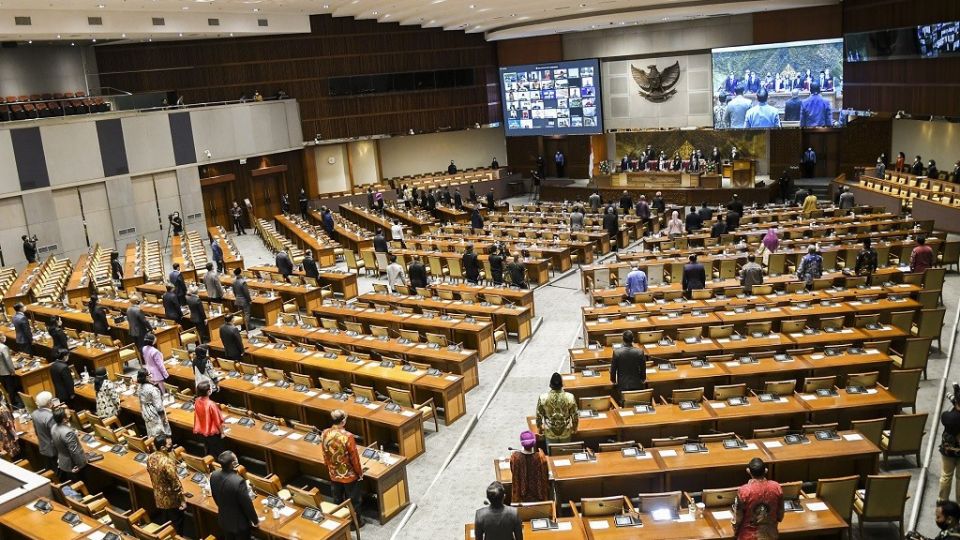October 12, 2022
JAKARTA – The House of Representatives concluded a plenary meeting on Sept. 20 establishing the omnibus bill on financial sector reform as a parliament-proposed bill. The bill introduces considerable changes from the initial draft proposed by the government in collaboration with the parliament in 2020, some of which are highly contentious.
One of the most contentious changes in the final draft is the qualifications set for Bank Indonesia’s (BI) board of governors. The requirements and disqualifiers for governor candidates are regulated under Law no. 23/1999 on BI. Within that law, article 47 has three clauses, with clause c specifically stating that “administrators or members of a political party cannot join the BI board of governors”. The new omnibus bill draft plans to strike clause c from the law, allowing politicians to govern the central bank.
This change was immediately opposed by many economists and academics for several reasons, in particular for the potential for conflict of interest. A politician has an inherent obligation to work in the interests of their political party, which is evident in Indonesia’s history. Prior to BI reforms in 2004, the central bank was an institution under the government and monetary policy was used as a political tool.
This new change adds fire to the longstanding concerns that the omnibus bill would reduce the independence of financial regulators in the Financial System Stability Committee (KSSK). In the early 2020 draft of the omnibus bill, the authority of the finance minister would be increased from coordinator to committee chair, giving the supervisory role to the Financial Services Authority (OJK) and the Indonesian Deposit Insurance Corporation (LPS).
If the bill passes then the LPS would need its annual budget and workplan to be approved by the financial minister, while the OJK would need its annual budget and workplan to be discussed with the government and, through representation by the minister, approved by the House. (Read: Omnibus finance bill draft reduces BI, OJK, LPS independence)
Contentious changes to the omnibus bill do not end there. Aside from reducing the independence of financial regulators, the new bill draft would also directly affect the commercial sector by applying stricter regulations on banks.
The bill draft proposed in 2020 added article 8A to law no. 7/1992 on banks, which mandates that commercial banks must adjust their interest rate thresholds within seven days after BI sets its targeted interest rate. The most recent draft by the House Commission XI, which oversees financial affairs, has removed the seven-day deadline and leaves it to be regulated by a new OJK regulation. There is no indication how long the time limit will be set in the planned OJK regulation, but bankers are expecting a much wider space since the estimated average time it takes for banks to adopt BI’s interest rates when left to market mechanisms ranges between three to six months.
What’s more
The time it takes for a bank to adjust its interest rate depends on its operations and size. The more long-term loans a bank gives and the less liquidity they have, the more time they need to adjust their operations and cash flow to adopt central bank interest rates. Therefore, the law would affect smaller banks more.
The omnibus bill plans to make the stricter deadline more feasible for banks by expanding the LPS. To do this, the bill will add article 20A to law no. 24/2004 on the LPS. This change removes the restriction that says the LPS can only give short-term loans to banks that qualify for BI loans. With this, smaller banks or banks experiencing liquidity difficulties would have more leeway adjust their interest rate faster.
However, the expansion of the LPS’ duties does not end there. Previously, the LPS’ primary duty was to act as guarantor for bank deposits. But the omnibus bill makes it so that the LPS will now also act as guarantor for insurance policies. House Commission XI deputy chairman Amir Uskara during the meeting said this would include various types of insurance, including but not limited to health, education and vehicle insurance.
What we’ve heard
A source with knowledge of the omnibus bill’s drafting process explains that the Democratic Party of Struggle (PDIP) played a significant role in creating the opportunity for politicians to govern the central bank. They aggressively pushed for the erasure of a clause that prevents members of political parties from joining the board of governors. “Although nine parties agreed with the proposal, the PDIP was the main driver,” said a high-ranking member of the party.
The same source added that attempts were made to push this change into other proposals for Bank Indonesia (BI) regulation revisions, long before the omnibus bill came into the conversation. The one who proposed this change was the PDIP. “This change was eventually removed from the BI law revision draft. However, it would frequently find its way back into the draft,” the source added. The same happened when the omnibus bill was being made.
In order to expedite the process, the House took over the omnibus bill and made it a House initiative during hearings in September. The original initiator of this bill was the government with initial proposals made by Finance Minister Sri Mulyani, however, components of the omnibus bill have drastically changed.
Disclaimer
This content is provided by Tenggara Strategics in collaboration with The Jakarta Post to serve the latest comprehensive and reliable analysis on Indonesia’s political and business landscape. Access our latest edition to read the articles listed below:
Politics
- CSIS survey shows young voters want change, not Prabowo
- Nadiem sparks new controversy with his ‘shadow organization’
- Search for best VP candidate begins
- Prabowo-Jokowi ‘joint secretariat’ looks to keep Jokowi in power
Business and Economy
- Jokowi ramps up EV domestic production with Inpres No. 7/2022
- Govt looks to neglected gas network to reduce LPG imports
- Inflation soars in September, highest since 2014.


